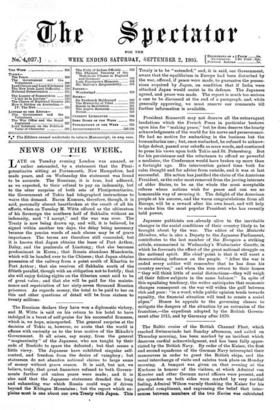Japanese publicists are .already alive to the inevitable changes in
the social conditions of their country likely to be brought about by the war. The editor of the Mainicisi Shimbun, who is also a Deputy to the Japanese Parliament, contributes to the last number of the Europeen a striking article, summarised in Wednesday's Westminster Gazette, in which he forecasts the effect of the great national struggle on the national spirit. His chief 'point is that it will exert a democratising influence on the people. "After the war is ended every soldier will remember that he has done his country service," and when the men return to their homes f` they will think little of social distinctions—they will weigh all their fellow subjects in the same balance." In spite of this equalising tendency, the writer anticipates that economic changes consequent on the war will widen the gulf between rich and poor: "in a word, while public opinion tends towards equality, the financial situation will tend to create a social abyss." Hence he appeals to the governing classes to mitigate the dangers of the situation by an extension of the franchise,—the expedient adopted by the British Govern- ment after 1815, and by Germany after 1870.


































